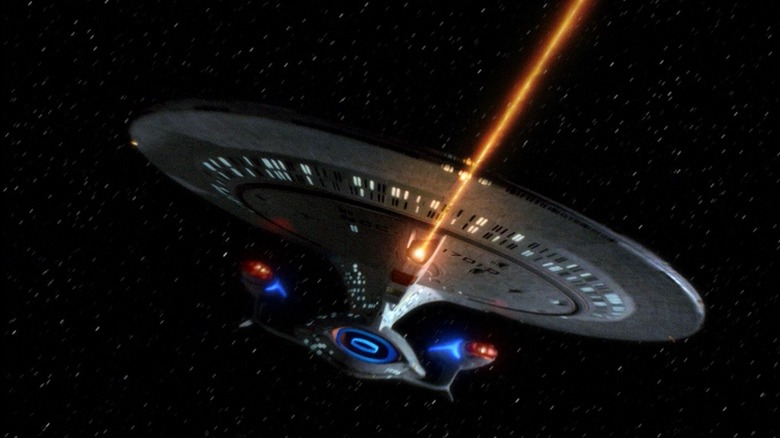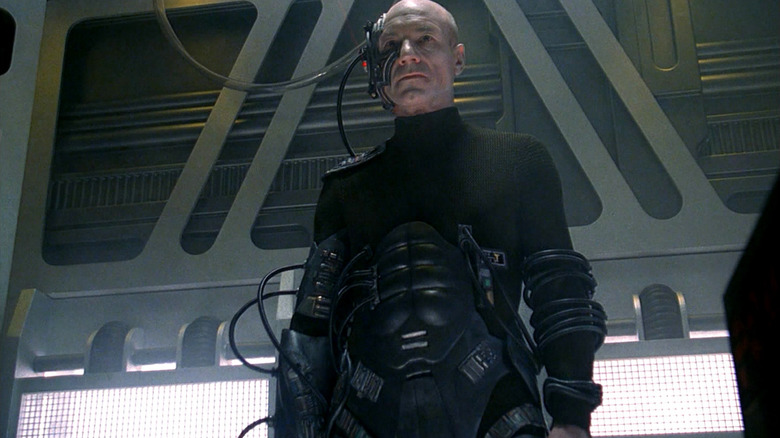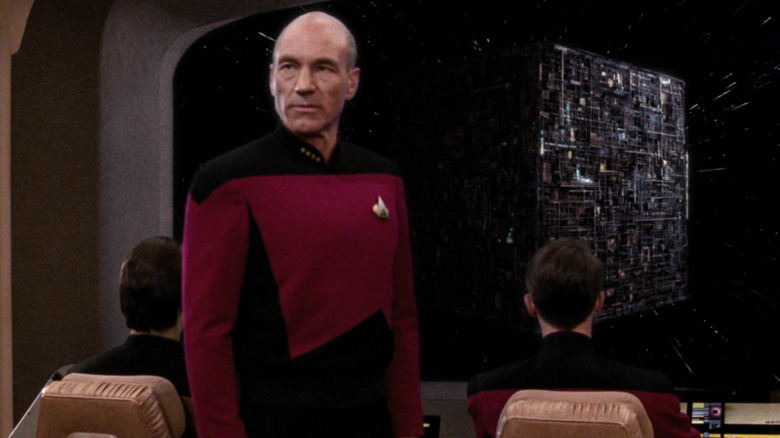Star Trek: The Next Generation Scrapped An Entire Borg Storyline From The Finale
The series finale of "Star Trek: The Next Generation" was called "All Good Things..." and it aired as a two-hour special event on May 23, 1994. The story followed Captain Picard (Patrick Stewart) as he found himself uncontrollably skipping between three time periods. In one time period, it was merely his present, and he investigated his temporal mystery as he would on any other episode of the series. In the second, he was hurled back in time seven years to when the Enterprise-D was just beginning its first mission. In the third timeline, Picard was in his own future, now an old man suffering from a rare brain disease.
The "time skips" were seemingly orchestrated by the trickster god Q (John De Lancie) whose impishness caused Picard to accidentally create — in all three timelines simultaneously — a spatial cloud that got larger and larger the further backward in time it traveled. Yes, that's a causality paradox. Q argues that that's the point. "All Good Things..." was an excellent episode overall. Not only did the future timeline give Trekkies a nerdy new way to analyze the series, but it was also an intelligent and heady science fiction story. It was a great way to wrap up a great TV series.
But it was originally intended to be even more complicated. The episode's writers, Brannon Braga and Ronald D. Moore, revealed in a 2014 retrospective with Yahoo! News, that they wanted a fourth timeline in the episode as well. In one version of their script, Picard was also going to be thrown back in time only four years to face the events of the popular cliffhanger episode "The Best of Both Worlds," the one where Picard was assimilated by the Borg.
One timeline too many
Moore recalls the writing of "All Good Things..." to be a very busy time. Not only was "Next Generation" wrapping up, but the cast and crew were busy preparing for "Star Trek: Generations," the first "NextGen"-inspired feature film which was scheduled for theatrical release only six months after the last episode was to air. Regardless, he and Braga got very ambitious with their four-prong story, hoping to find an interesting and organic way to resurrect the Borg, the series' most infamous villains. It was showrunner Michael Piller who ultimately felt that a Borg timeline was one toke over the line. Moore said:
"The first story outline, I think, had four timelines that we were going to go back to. The fourth one, which eventually got dropped from the final teleplay, was revisiting the events of 'The Best of Both Worlds,' when Picard was taken and turned into [a Borg named] Locutus. So originally, the finale was going to bounce between those four events. And Michael, I think, rightly said, 'It's one too many, and we want this to kind of be the beginning, middle, and end of his life.' And that kind of simplified everything, and it became much cleaner and easier to go through it from that angle."
It also may have been a blessing, as using the Borg in the final episode of "Next Generation" may have drawn focus from Picard and taken an extra step in the already-growing overexposure of the cyber monsters. The Borg already featured in two season-ending cliffhangers, and would later be featured in the 1996 film "Star Trek: First Contact." Best to stay far away for the close-out moments of a "Star Trek" series.
Can you imagine bringing back the Borg to end another Trek series? Absurd!
Overexposing the Borg
It's been mentioned in the pages of /Film before that Trek's writers came to over-rely on the Borg. Indeed, they came to be featured in all three seasons of "Star Trek: Picard," representing a smaller and smaller threat each time. Regardless, Braga was still fond of the legacy the villains had on the series and hoped to incorporate them into the final episode kind of as an homage. Ultimately, Braga couldn't think of a good Borg story. Piller was right to nix the idea. Braga said:
"We talked a lot about the Borg, and wanted to find a way to get the Borg back into the show, but we could never find anything that would top 'Best of Both Worlds,' other than those standalone Borg stories: Data and the Borg; 'I, Borg.' It felt a little superfluous to put it into 'All Good Things...." Three timelines felt like the right amount of timelines. We would, of course, end up using the Borg for one of the movies later, and they were much better on the big screen."
The "Data and the Borg" comment is a reference to "Descent" (June 21 and September 20, 1993) the two-part episode that bridges the show's sixth and seventh seasons. "I, Borg" (May 10, 1992) was a story of a single Borg drone that was separated from its machine collective and began to develop a sense of individuality. The movie Braga referred to was, of course, "Star Trek: First Contact." Leaving the Borg out of "All Good Things..." was ultimately wise.


